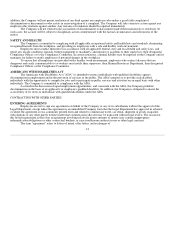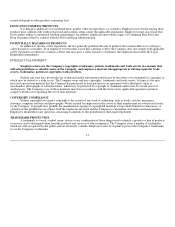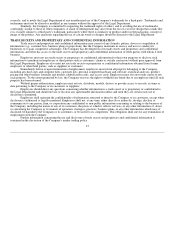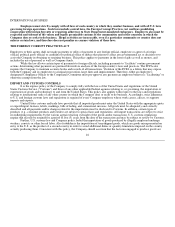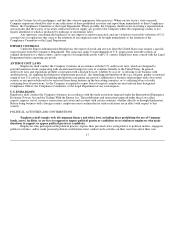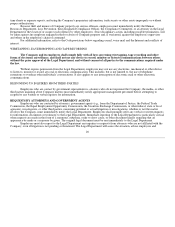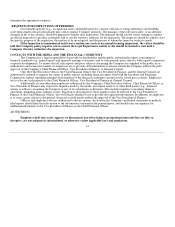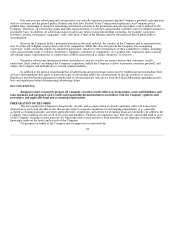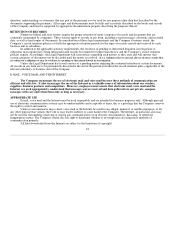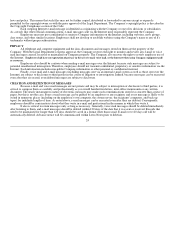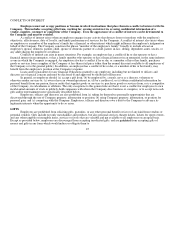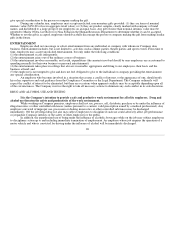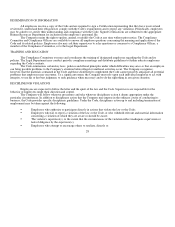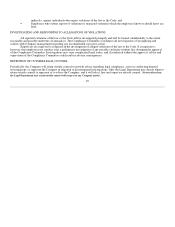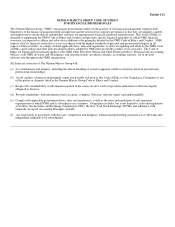Neiman Marcus 2002 Annual Report Download - page 159
Download and view the complete annual report
Please find page 159 of the 2002 Neiman Marcus annual report below. You can navigate through the pages in the report by either clicking on the pages listed below, or by using the keyword search tool below to find specific information within the annual report.
Fair and accurate advertising and sales practices are critically important in preserving the Company's goodwill and reputation
with its customers and the general public. Federal and state laws, Federal Trade Commission regulations, and Company policy
prohibit false, misleading or deceptive advertising and related activities in the promotion and sale of products sold or offered by the
Company. Therefore, all advertising claims and other representations to customers and potential customers must be truthful and have a
reasonable basis. In addition, all advertising claims made in any print or non-print medium, including, for example, catalogues,
brochures, posters, newspapers, magazines, radio, television, e-mail or the Internet, must be substantiated before publication or
dissemination.
Because the Company holds a prominent position in the retail industry, the conduct of the Company and its representatives
may be subjected to higher scrutiny than some of its competitors. While this does not prevent the Company from competing
vigorously, it does mean that employees should be particularly sensitive to the consequences of their competitive conduct, including
even casual remarks made to vendors, distributors, suppliers, customers or competitors. As a general rule, employees must avoid all
advertising claims, representations or conduct that could be characterized as unfair, deceptive, or coercive.
Deceptive advertising, misrepresentations and unfair or coercive conduct are serious matters that consumers readily
understand. Such conduct can damage the Company's reputation, nullify the Company's efforts to promote consumer goodwill, and
subject the Company and individuals to civil and criminal liability.
In addition to the general requirement that all advertising and promotional claims must be truthful and not misleading, there
are laws and regulations that apply to particular types of advertising and/or the advertisement of specific products or services.
Employees involved in the preparation or publication of advertising must seek advice from the Legal Department regarding specific
laws and regulations before disseminating advertising claims.
RECORD KEEPING
Employees must accurately prepare all Company records to fairly reflects its transactions, assets and liabilities, and
must maintain and safeguard such records and supporting documentation in accordance with the Company's policies and
procedures and applicable legal and accounting requirements.
PREPARATION OF RECORDS
The law requires the Company to keep books, records, and accounts which accurately and fairly reflect all transactions,
disposition of assets and all other events that are the subject of specific regulatory record keeping requirements (e.g., generally
accepted accounting principles and other applicable rules, regulations, and criteria for preparing financial statements). In addition, the
Company must maintain records of all of its assets and liabilities. Under no circumstances may there be any unrecorded fund or asset
of the Company, regardless of the purposes for which the fund or asset may have been intended, or any improper or inaccurate entry
knowingly made on the books and records of the Company.
No payment on behalf of the Company may be approved or made with the
22


